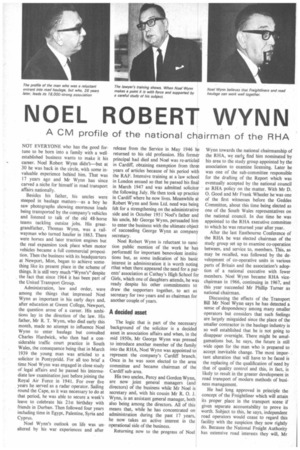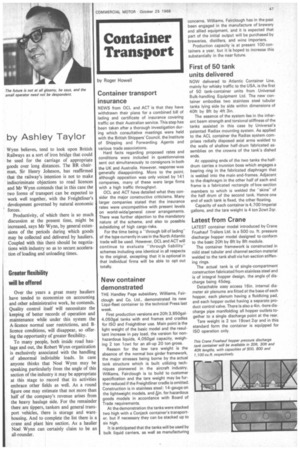NOEL ROBERT WYNN
Page 48

Page 49

If you've noticed an error in this article please click here to report it so we can fix it.
A CM profile of the national chairman of the RHA by Ashley Taylor
NOT EVERYONE who has the good fortune to be born into a family with a wellestablished business wants to make it his career. Noel Robert Wynn didn't—but at 30 he was back in the circle, with some invaluable experience behind him. That was 17 years ago and Mr Wynn has since carved a niche for himself in road transport affairs nationally.
Besides his father, his uncles were steeped in haulage matters—as a boy he saw photographs showing enormous loads being transported by the company's vehicles and listened to talk of the old 48-horse teams tackling outsize jobs. His greatgrandfather, Thomas Wynn, was a railwayman who turned haulier in 1863. There were horses and later traction engines but the real expansion took place when motor vehicles became a full commercial proposition. Then the business with its headquarters at Newport, Mon, began to achieve something like its present place in the scheme of things. It is still very much "Wynn's" despite the fact that since 1964 it has been part of the United Transport Group.
Administration, law and order, were among the things that impressed Noel Wynn as important in his early days and, after education at Gwent College, Newport, the question arose of a career. His ambitions lay in the direction of the law. His father, Mr R. T. Wynn, who died early this month, made no attempt to influence Noel Wynn to enter haulage but consulted Charles Hardwick, who then had a considerable traffic court practice in South Wales, the consequence being that in March 1939 the young man was articled to a solicitor in Pontypridd. For all too brief a time Noel Wynn was engaged in close study of legal affairs and he passed his intermediate law examination just before joining the Royal Air Force in 1941. For over five years he served as a radar operator. Sailing round the Cape, as it was necessary to do at that period, he was able to secure a week's leave to celebrate his 21st birthday with friends in Durban. Then followed four years including time in Egypt, Palestine, Syria and Cyprus.
Noel Wynn's outlook on life was unaltered by his war experiences and after release from the Service in May 1946 he returned to his old profession. His former principal had died and Noel was re-articled in Cardiff, obtaining exemption from three years of articles because of his period with the RAF. Intensive training at a law school in London ensued so that he passed his final in March 1947 and was admitted solicitor the following July. He then took up practice in Cardiff where he now lives. Meanwhile at Robert Wynn and Sons Ltd. need was being felt for a strengthening on the administrative side and in October 1951' Noel's father and his uncle, Mr George Wynn, persuaded him to enter the business with the ultimate object of succeeding George Wynn as company secretary.
Noel Robert Wynn is reluctant to sanction public mention of the work he has performed for important benevolent institutions but, as some indication of his basic interest in administration it is worth noting rthat when there appeared the need for a parents' association at Cathay's High School for Girls, which one of daughters attends, he was ready despite his other commitments to draw the supporters together, to act as secretary for two years and as chairman for another couple of years.
A decided asset
The logic that is part of the necessary background of the solicitor is a decided asset in association affairs and when, in the mid 1950s, Mr George Wynn was pressed to introduce another member of the family into the RHA, Noel Wynn was appointed to represent the company's Cardiff branch. Once in he was soon elected to the area committee and became chairman of the Cardiff sub-area.
His two uncles, Percy and Gordon Wynn, are now joint general managers (and directors) of the business while Mr Noel is secretary and, with his cousin Mr R. 0. J. Wynn, is an assistant general manager, both also being among the directors. All of this means that, while he has concentrated on administration during the past 17 years, he now takes an active interest in the operational side of the business.
Returning now to the progress of Noel Wynn towards the national chairmanship of the RHA, we earl find him nominated by his area to the study group appointed by the association to examine licensing. Later he was one of the sub-committee responsible for the drafting of the Report which was eventually accepted by the national council as RHA policy on the matter. With Mr D. 0. Good and Mr Frank Wheeler he was one of the first witnesses before the Geddes Committee, about this time being elected as one of the South Wales representatives on the national council. In due time he was appointed to the RHA executive committee to which he was returned year after year.
After the last Eastbourne Conference of the RHA he was elected chairman of the study group set up to examine co-operation between, and service to, members. This, as may be recalled, was followed by the development of co-operative units in various parts of Britain and the association's adoption of a national executive with fewer members. Noel Wynn became RHA vicechairman in 1966, continuing in 1967, and this year succeeded Mr Phillip Turner as national chairman.
Discussing the effects of the Transport Bill Mr Noel Wynn says he has detected a sense of despondency among many smaller operators but considers that such feelings are largely misguided since the place of the smaller contractor in the haulage industry is so well established that he is not going to disappear overnight. There might be amalgamations but, he says, the future is still wide open for the man who is prepared to accept inevitable change. The most important alteration that will have to be faced is the replacing of the qualification of need by that of quality control and this, in fact, is likely to result in the greater development in road transport of modern methods of business management.
He had long approved in principle the concept of the Freightliner which will attain its proper place in the transport scene if given separate accountability to prove its worth. Subject to this, he says, independent road operators would cease to regard this facility with the suspicion they now rightly do. Because the National Freight Authority has extensive road interests they will, Mr Wynn believes, tend to look upon British Railways as a sort of iron bridge that could be used for the carriage of appropriate goods over long distances. The BR chairman, Sir Henry Johnson, has reaffirmed that the railway's intention is not to make indiscriminate objections to road licences and Mr Wynn contends that in this case the two forms of transport can be expected to work well together. with the Freightliner's development governed by natural economic forces.
Productivity, of which there is so much discussion at the present time, might be increased, says Mr Wynn, by general extensions of the periods during which goods may be collected and delivered by hauliers. Coupled with this there should be negotiations with industry so as to secure acceleration of loading and unloading times.
Greater flexibility will be offered
Over the years a great many hauliers have tended to economize on accounting and other administrative work, he contends. Quality control itself will necessitate the keeping of better records of operation and maintenance while under this system the A-licence normal user restrictions, and Blicence conditions, will disappear, so offering the opportunity of greater flexibility.
To many people, both inside road haulage and out, the Robert Wynn organization is exclusively associated with the handling of abnormal indivisible loads. In case anyone thinks that Noel Wynn may be speaking particularly from the angle of this section of the industry it may be appropriate at this stage to record that its activities embrace other fields as well. As a round figure one may estimate that not more than half of the company's revenue arises from the heavy haulage side. For the remainder there are tippers, tankers and general transport vehicles, there is storage and warehousing. And to complete the list there is a crane and plant hire section. As a haulier Noel Wynn can certainly claim to be an all-rounder.
















































































































